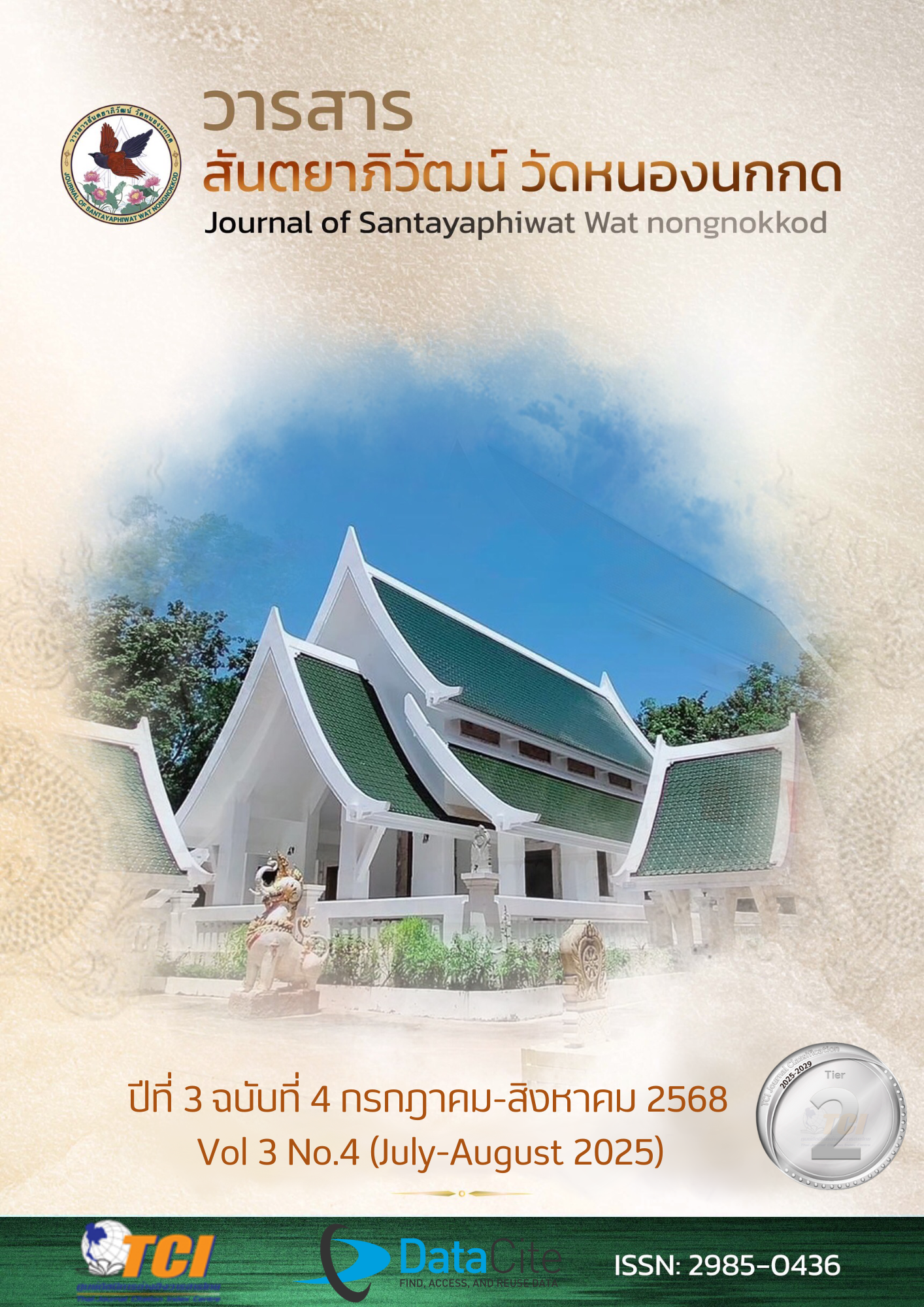MANAGEMENT SKILLS COMPONENTS OF EDUCATIONAL ADMINISTRATORS IN THE DIGITAL ERA UNDER MAHA SARAKHAM PROVINCIAL OFFICE OF LEARNING ENCOURAGEMENT
Keywords:
anagement Skills Components of Administrative Skills in the Digital Era, School Administrators, Mahasarakham Provincial Office of Learning EncouragementAbstract
The objectives of this research were 1) to analyze the components of administrative skills of school administrators in the digital era and 2) to analyze confirmatory factors of administrative skills of school administrators in the digital era under Mahasarakham Provincial Office of Learning Encouragement. This research was a descriptive research. The sample group consisted of school administrators, teachers, other educational personnel, and the committee for promoting and developing learning management in schools under Mahasarakham Provincial Office of Learning Encouragement, with the total number of 400 people, using stratified random sampling method. The research instruments were a 5-level rating scale questionnaire with content validity between 0.67-1.00 and a questionnaire reliability=0.95, and a semi-structured interview. The statistics used in data analysis comprised frequency, percentage, mean, exploratory factor analysis, and confirmatory factor analysis. :
- The results of exploratory factor analysis of administrative skills of school administrators in the digital era were found that, in order of the factor weights, they were as follows: 1) Transferring and digital communication, with weight between 0.939 - 0.945, 2) Digital for school administration with weight range between 0.885 - 0.9153, 3) Innovative thinking with weight between 0.909 - 0.923 and 4) Learning and teaching management in digital era with weight between 0.870 - 0.891.
- The results of exploratory factor analysis of administrative skills of school administrators in the digital era were found that the measurement model was consistent with the empirical data. The level of consistency was equal to 23.793, P-value was equal to 0.3032, with no statistical significance, SRMR was equal to 0.023, RMSEA was equal to 0.018, CFI = 1.00 and TLI was equal to 0.999, with statistical significance at .01 level for all values.
References
กลุ่มงานยุทธศาสตร์และข้อมูลเพื่อการพัฒนาจังหวัด จังหวัดมหาสารคาม. (2567). แผนปฏิบัติการดิจิทัลของจังหวัดมหาสารคาม พ.ศ. 2567 – 2570. จังหวัดมหาสารคาม.
เกียรติศักดิ์ ลำพองชาติ. (2563). ทักษะการทำงานในโลกยุคดิจิทัล. ใน บทความวิชาการกลุ่มงานติดตามและประมวลผลงานของวุฒิสภา. กรุงเทพฯ: สำนักงานเลขาธิการวุฒิสภา.
คมกฤช พรหมฉิน. (2560). การวิเคราะห์องค์ประกอบเชิงยืนยันของภาวะผู้นำเชิงกลยุทธ์ในศตวรรษที่ 21 ของผู้บริหารสถานศึกษา. ใน วิทยานิพนธ์ครุศาสตรมหาบัณฑิต สาขาวิชาการบริหารการศึกษา. บัณฑิตวิทยาลัย มหาวิทยาลัยราชภัฏรำไพพรรณี.
ณัฐภัทร ชอบประดิษฐ์. (2568). ภาวะผู้นำในยุคดิจิทัลของผู้บริหารสถานศึกษา สังกัดสำนักงานเขตพื้นที่การศึกษาประถมศึกษาลพบุรี เขต 1. วารสารสันตยาภิวัฒน์ วัดหนองนกกด, 3(2), 149-160
ธนวัฒน์ สุวรรณเหลา. (2564). ทักษะของผู้บริหารสถานศึกษาในยุคดิจิทัล สังกัดสำนักงานเขตพื้นที่การศึกษาประถมศึกษาปทุมธานี เขต 2. ใน วิทยานิพนธ์ปริญญามหาบัณฑิต ไม่ได้ตีพิมพ์. มหาวิทยาลัยเทคโนโลยีราชมงคลธัญบุรี.
ธิดารักษ์ ฟักเงิน. (2566). การวิเคราะห์องค์ประกอบทักษะการบริหารของผู้บริหารสถานศึกษาในยุคดิจิทัล สังกัดสำนักงานเขตพื้นที่การศึกษามัธยมศึกษานครปฐม. ใน วิทยานิพนธ์ครุศาสตรมหาบัณฑิต สาขาวิชาการบริหารการศึกษา. มหาวิทยาลัยราชภัฏนครปฐม.
นงลักษณ์ วิรัชชัย. (2542). โมเดลลิสเรล สถิติวิเคราะห์สำหรับการวิจัย. (พิมพ์ครั้งที่ 3). กรุงเทพฯ: โรงพิมพ์จุฬาลงกรณ์มหาวิทยาลัย.
นัฐกฤตา เกียรติกาญจน์ และคณะ. (2565). องค์ประกอบของทักษะการคิดเชิงนวัตกรรมของผู้บริหารสถานศึกษา. วารสารวิชาการร้อยแก่นสาร มหาวิทยาลัยนเรศวร, 7(3), 59.
ปุณณิฐฐา มาเชค. (2565). การบริหารองค์กรทางการศึกษาในยุคดิจิทัล. มหาวิทยาลัยบูรพา.
ยุทธ ไกยวรรณ์. (2557). การวิเคราะห์สถิติหลายตัวแปรสำหรับงานวิจัย. กรุงเทพฯ: จุฬาลงกรณ์มหาวิทยาลัย.
สำนักงานส่งเสริมการเรียนรู้ประจำจังหวัดมหาสารคาม. (2566). แผนพัฒนาการศึกษาสำนักงานส่งเสริมการเรียนรู้ประจำจังหวัดมหาสารคาม พ.ศ. 2566 – 2570. สำนักงานส่งเสริมการเรียนรู้ประจำจังหวัดมหาสารคาม.
สุกัญญา แช่มช้อย. (2561). การบริหารสถานศึกษาในยุคดิจิทัล. กรุงเทพฯ: โรงพิมพ์แห่งจุฬาลงกรณ์มหาวิทยาลัย.
สุนทรพจน์ ดำรงพานิช. 2555. โปรแกรม Mplus กับการวิเคราะห์ข้อมูลทางพฤติกรรมศาสตร์และสังคมศาสตร์. มหาสารคาม : สำนักพิมพ์มหาวิทยาลัยมหาสารคาม.
Bush, T. (2011). Theories of Educational Leadership & Management. (4th ed.). London: Sage.
Day, C., & Sammons, P. (2016). Successful school leadership. Berkshire, England: Education Development Trust.
Drake, Thelbert L., & Roe, William H. (1986). The Principalship. (3rd ed.). New York: Macmillan.
Eric Sheninger. (2019). Digital Leadership: Changing Paradigms for Changing Times. (2nd ed.). California: SAGE Publications Asia-Pacific.
Good, Carter V. (1973). Dictionary of Education. New York: McGraw Hill.
Horth, D., & Buchner, D. (2014). Innovation Leadership: How to Use Innovation to Lead Effectively, Work Collaboratively, and Drive Results. San Diego: The Center for Creative Leadership.
Katz, Robert L. (1983). Executive Success Management. New York: John Wiley and Sons.
Kim, G. (2016). The research paper in the digital age: Educating digitally literate students in the academic library environment. New Jersey: The State University of New Jersey.
Sergiovanni, T. (1989). The Leadership Needed for Quality Schooling. In Schooling for Tomorrow: Directing Reforms to Issues That Count. Edited by T.J. Sergiovanni & J.H. Moore. pp. 213-226. Boston: Allyn and Bacon.
Sheninger, E. (2014). Digital leadership: Changing paradigms for changing times. New York: International Center for Leadership in Education.
Smith, H. B. (1974). Effective and Ineffective Behavior of School Principals. Dissertation Abstracts International, 48(2), 1935-A.









